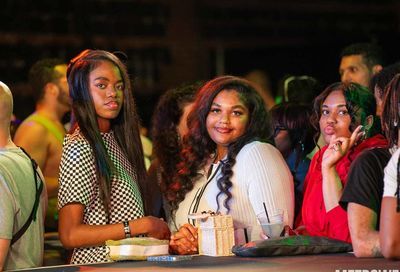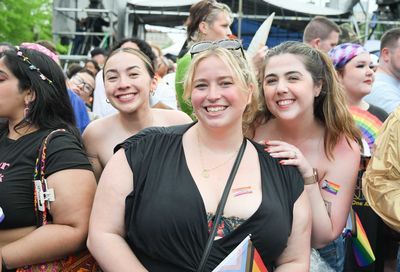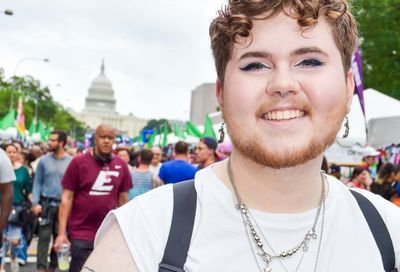Hamburger Mary’s Orlando Sues Florida Over Anti-Drag Law
Hamburger Mary's is suing Florida over a law to restrict drag performances, claiming it violates the restaurant's First Amendment rights.

Hamburger Mary’s Orlando has filed a federal lawsuit against Florida Republican Gov. Ron DeSantis and the state of Florida over a law restricting “adult live performances,” which critics say is so broadly written that it will be used to ban drag performances.
According to the Orlando Sentinel, the restaurant, which hosts what it bills as a “family-friendly” drag brunch on Sundays — is seeking a temporary restraining order to prevent the state from enforcing the law.
Under the law, signed by DeSantis last week, if a drag performance is deemed an “adult live performance” — defined as a performance that “depicts or simulates nudity, sexual conduct, sexual excitement, or specific sexual activities…lewd conduct, or the lewd exposure of prosthetic or imitation genitals or breasts” — the venue that hosted the show can potentially have their business license suspended or revoked if minors are present.
The state can also suspend or revoke an establishment’s liquor license if the venue admits a minor to a show that may be deemed to be inappropriate for those under the age of 18. The state may also bring legal action against any governmental entity that grants a permit to an event deemed an “adult live performance,” and may even prosecute individuals who “knowingly” expose minors to such performances.
According to the lawsuit, Hamburger Mary’s Orlando says it’s already suffered the loss of business after informing customers that children would no longer be allowed at the restaurant on Sundays.
Already, they claim the restaurant — part of a national chain, including three other locations in Florida (none of which are connected to the lawsuit) — claims the number of Sunday reservations has dropped by about 20% since restricting entry, creating a negative financial impact.
“In addition to the loss of customers canceling, the establishment has had to ban children from the family-friendly performances because they simply cannot take the chance that their business or liquor licenses would be suspended for hosting a drag show where children attend,” the lawsuit states. “In addition, the criminal penalties of the law put individuals at risk of prosecution because of the content of their speech.”
Hamburger Mary’s Orlando also notes that, under the DeSantis administration, the Florida Department of Business and Professional Regulation — which oversees professional and liquor licensing for various venues — has intentionally targeted drag shows and the venues that host them by aggressively pursuing investigations based on complaints that children may have been present at shows containing “lewd, indecent or obscene content.”
In the lawsuit, the restaurant notes that the state sought to strip venues in Miami and Orlando of their liquor licenses for hosting a nationally touring Christmas-themed drag show where children are alleged to have been present — even though undercover investigators, working on behalf of the state, had reported that nothing “lewd” had occurred during the show.
According to the Popular Information online newsletter, the complaints filed against the venues appear to have exaggerated or misrepresented facts from the undercover agents’ reports.
In the lawsuit, Hamburger Mary’s Orlando argues that the law is so vague and overly broad, in terms of how it’s written, that it unfairly burdens individuals and businesses based on any person’s belief of what constitutes “patently offensive” content.
While the law speaks of “prevailing standards in the adult community…with respect to what is suitable material or conduct for the age of the child present,” even those “standards” are open to wide interpretation, and are often based on individuals’ preferences or personal biases.
The lawsuit argues that the ban violates the First Amendment, not only because of its vagueness, but because it prohibits speech and freedom of expression based on the identity of the speaker or performer, rather than being content-neutral.
Hamburger Mary’s Orlando co-owner, John Paonessa, defended the restaurant’s decision to sue over the law in a post on the restaurant’s Facebook page.
“This bill has nothing to do with children, and everything to do with the continued oppression of the LGBTQ+ community,” he wrote. “Anytime our legislators want to demonize a group, they say they are coming for your children. In this case, creating a false narrative that drag queens are grooming and recruiting your children with no factual basis or history to back up these accusations AT ALL!”
Mike Mandell, an attorney with Law By Mike, who has become known on social media for his short videos explaining legal issues, told Metro Weekly that the essential arguments over Florida’s anti-drag law will boil down to the state arguing the law is needed to protect minors, while Hamburger Mary’s Orlando claims it infringes on the restaurant’s First Amendment rights.
According to Mandell, the court typically looks at any law restricting freedom of speech or expression with the strictest amount of scrutiny, meaning they’re very reluctant to do anything that would restrict those rights.
However, he notes, if speech or a form of expression is deemed obscene, it is not constitutionally protected — something that the Supreme Court has ruled in other First Amendment cases.
For something to be found obscene, it has to lack “artistic, literary, political, or scientific value,” something Mandell notes may be difficult for the state to argue, given the artistic nature of many drag performances.
However, the caveat is that courts have also upheld state laws protecting minors, which will likely be the basis for Florida’s legal argument justifying the restrictions on “adult live performances.”
The state will also likely argue that what is not considered “obscene” for adults may be regarded as obscene for children — although the vagueness of the law, and the shifting standards of what may be inappropriate based on a minor’s age, may complicate that argument.
“I see some issues with the law being as broad as it is,” says Mandell. “They try to define ‘obscenity’ based on past case law, where something appeals to the prurient, shameful or morbid interest, is patently offensive to the prevailing standards in the adult community of the state, or, when taken as a whole, lacks serious literary, artistic, political or scientific value. But what does it mean when the law’s definition of obscenity is based on ‘the age of the child present’? That could vary for every single age group.
“The more confusion and harder it is to apply this law, the stronger it is for Hamburger Mary’s, because, if it’s affecting people’s ability to understand or know if the law could affect them, if it could result in some type of fines or whatnot, that’s generally an indication that the law is too broad and affecting one of our most important constitutional rights.”
For now, Mandell sees Hamburger Mary’s as having the more compelling legal argument, as they will likely be able to argue that the law isn’t narrowly tailored enough to avoid infringing on the First Amendment.
He also sees it more difficult for the state to argue that all forms of drag are inherently sexual, citing the need to analyze what is actually occurring in shows.
“If a performer is doing something that is sexual in nature, like simulating sexual conduct or something like that, that could be seen as something to be protecting minors from,” Mandell says. “But when it comes to the simple act of someone dressing in drag, I think the state will have a much harder argument arguing that that is something that cannot be done, or that is not protected by the First Amendment.”
Support Metro Weekly’s Journalism
These are challenging times for news organizations. And yet it’s crucial we stay active and provide vital resources and information to both our local readers and the world. So won’t you please take a moment and consider supporting Metro Weekly with a membership? For as little as $5 a month, you can help ensure Metro Weekly magazine and MetroWeekly.com remain free, viable resources as we provide the best, most diverse, culturally-resonant LGBTQ coverage in both the D.C. region and around the world. Memberships come with exclusive perks and discounts, your own personal digital delivery of each week’s magazine (and an archive), access to our Member's Lounge when it launches this fall, and exclusive members-only items like Metro Weekly Membership Mugs and Tote Bags! Check out all our membership levels here and please join us today!


























You must be logged in to post a comment.